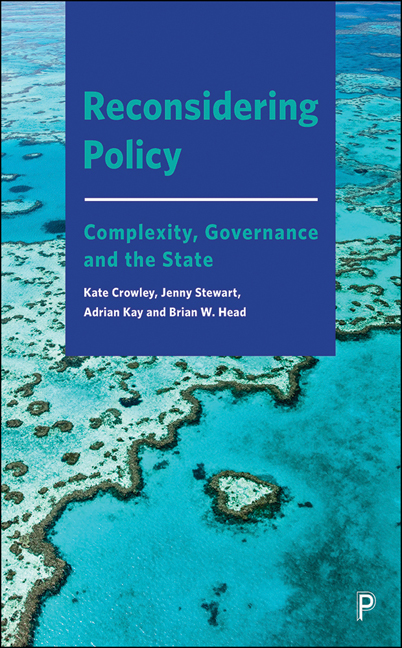Book contents
- Frontmatter
- Contents
- Detailed contents list
- List of tables
- List of abbreviations
- Notes on authors
- Preface: Re-Thinking the Policy Sciences after the ‘Governance Turn’ – Identifying and Creating a (more) Capable State
- 1 Reconsidering Policy – our Agenda
- 2 Reconsidering Policy Systems
- 3 Reconsidering Institutions
- 4 Reconsidering the State
- 5 Reconsidering Borders
- 6 Reconsidering Advice and Advisory Systems
- 7 Reconsidering Information
- 8 Reconsidering Implementation
- 9 Reconsidering Policy Change
- 10 Reconsidering Policy – our Agenda Revisited
- References
- Index
1 - Reconsidering Policy – our Agenda
Published online by Cambridge University Press: 23 February 2021
- Frontmatter
- Contents
- Detailed contents list
- List of tables
- List of abbreviations
- Notes on authors
- Preface: Re-Thinking the Policy Sciences after the ‘Governance Turn’ – Identifying and Creating a (more) Capable State
- 1 Reconsidering Policy – our Agenda
- 2 Reconsidering Policy Systems
- 3 Reconsidering Institutions
- 4 Reconsidering the State
- 5 Reconsidering Borders
- 6 Reconsidering Advice and Advisory Systems
- 7 Reconsidering Information
- 8 Reconsidering Implementation
- 9 Reconsidering Policy Change
- 10 Reconsidering Policy – our Agenda Revisited
- References
- Index
Summary
Introduction
Policy studies are in a rut. While policy problems have grown in complexity, decision makers and policy analysts have struggled to develop models and frameworks to assist both understanding and action (Kay, 2006). The need for better theories about the policy process – systemic but also empirically grounded – has been evident to many observers. Since the 1980s, the scholarly development of new approaches to policy studies has been mainly through deeper engagement with particular aspects of the policy process. For example, scholars have fruitfully explored the topics of policy design, policy implementation and how policy agendas are changed through political debate.
New theoretical approaches have proliferated, most of which were abstracted from deep empirical observation of US policy developments and institutional patterns. Cairney and Heikkila identified eight such theories, or theoretical lenses, each focusing in different ways on actors, institutions, networks, ideas or beliefs, context and events (Cairney and Heikkila, 2014). However, despite the best of intentions, it has not been possible to combine such lenses and insights to form an integrated contemporary approach to policy studies that would offer an assured basis for building knowledge (Pierre and Peters, 2000).
Despite the analytical eclecticism that therefore characterises much of policy studies, some important progress has been made. The critique (from policy studies) of ‘traditional’ policy analysis has brought a focus on the need for a more nuanced epistemology, one that acknowledges that policymaking should not be seen in purely instrumental or technocratic terms. Normative questions of value and goals of social progress have been reintroduced to scholarship as well as an acute awareness of the contested nature of policy problems themselves. Indeed, as the work by Bacchi and others reveals, what makes some set of social conditions a ‘public policy’ problem are its political features. Further still, the way a problem is represented and defined paves the way for a favoured set of policy solutions.
However, even with this relativistic streak, policy studies did not develop as a fully fledged ‘critical’ discipline, except in the sense used in discourse analysis. In the real world, policy-related debates became dichotomised. The right, for example, has been focused on the economy, the left on problems of identity politics, human rights and equity (Béland, 2017).
- Type
- Chapter
- Information
- Reconsidering PolicyComplexity, Governance and the State, pp. 1 - 10Publisher: Bristol University PressPrint publication year: 2020



